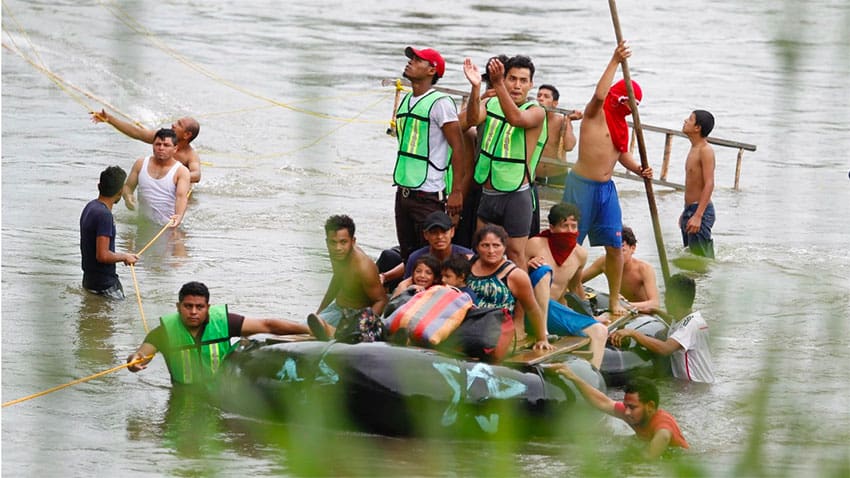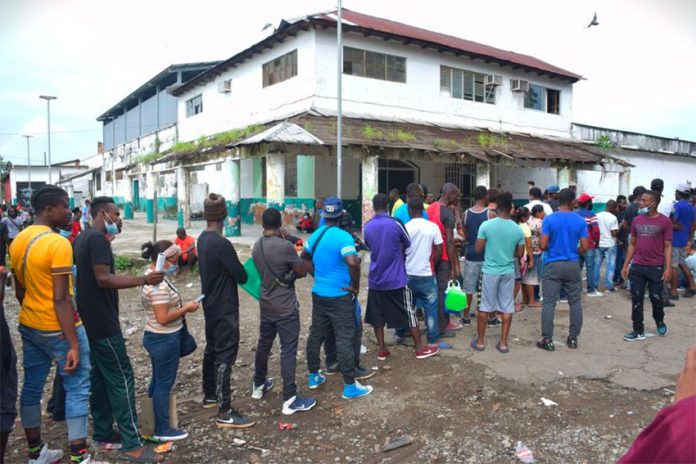A new wave of Haitian migrants has arrived in Tapachula, Chiapas, in the days since the country’s president was assassinated.
Some 2,500 Haitians have applied for asylum in Mexico in the past 10 days, according to the Mexican Commission for Refugee Assistance (Comar). The commission received more than 2,000 applications from Haitians on Monday alone.
“Normally 200 or 300 people arrive on Mondays to seek asylum … but 2,000 arrived this week. Those photos you’re seeing show the presence of 2,000 Haitians,” Comar chief Andrés Ramírez told a press conference.
“These photos … are not from Rwanda or Angola, … it’s Mexico, it’s Tapachula and they’re from Monday,” he said, acknowledging that last week’s events in Haiti could further “complicate the situation.”
Haitian President Jovenel Moïse was assassinated in the early hours of July 7, an event that triggered significant unrest in the Caribbean nation and is predicted to lead to a new exodus of asylum seekers.

Most of the Haitians already in Tapachula likely left their homeland before the assassination occurred, and some have been stranded in the city for months. Thousands more Haitian migrants have arrived in Mexico in recent years, typically via South American and Central American countries, and some have settled in Mexico, especially in Tijuana.
Although many of the Haitians currently in Chiapas are likely to attempt to seek asylum in the United States sometime in the future, many who spoke with the newspaper Milenio said they hoped to remain in Mexico, which has become a destination rather than transit country for an increasing number of migrants.
“Here we have the dream of having freedom and getting ahead, there’s no violence, we’re poor but calm,” said Jean Passé, a migrant originally from Port-au-Prince.
“… I left Haiti in December and [then] I was in the Dominican Republic. We paid to arrive by boat to Nicaragua then I was in Honduras, Guatemala and now I’m in Mexico, Tapachula. More friends and family are coming from [Haiti] because it’s more difficult there now because of the death of Moïse,” he said.
The 28-year-old said he is a qualified nurse but couldn’t find work at home. He also noted that Haiti is plagued by violence and poverty – and now great political uncertainty. A powerful earthquake in 2010 also wreaked havoc on the nation of some 11 million people.
María Leonard said that she originally planned to seek asylum in the United States or Canada. However, she now has her sights set on Tijuana.
“We have almost no money, the [bureaucratic] procedures are slow – I’ve been here in Tapachula three months and I still haven’t got the official papers to travel to Tijuana, that’s where I want to live, I have two family members and a friend there, that’s my destination now …” Leonard said.
Citing what they see as a tough United States immigration policy, other Haitians who spoke with Milenio also said they intended to remain in Mexico.
For now, life in Tapachula – located just north of the border with Guatemala – is not easy for the migrants. Many live in crowded conditions in cheap, basic rooms far from the downtown area of the medium-sized city where many of the services are located. Others bed down in migrant shelters, or in a park or the street if they’re full.
There are also large numbers of Cubans and Hondurans, meaning that the lines at Comar and United Nations Refugee Agency offices are invariably long. Observation of social distancing recommendations and the use of face masks is often lax, Milenio reported, and scuffles between migrants have been reported.
To alleviate crowding at Comar offices and the inherent risk of coronavirus infection, the commission’s Chiapas delegate, Alma Cruz, announced that asylum seekers can now initiate their claims online. She also said that Comar is aiming to speed up the process.
Ramírez, the Comar chief, said a new record for asylum applications will be set in Mexico this year. More than 51,600 were accepted to the end of June, just 20,000 short of the full year record of just over 70,000 set in 2019.
Almost 10,000 asylum applications have been filed by Haitians in Mexico this year. Only Hondurans have filed more.
